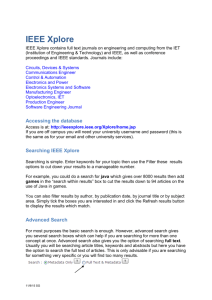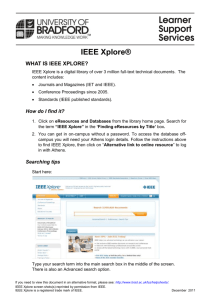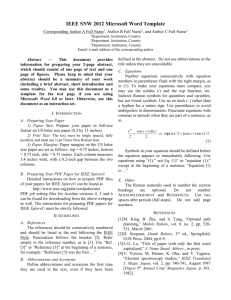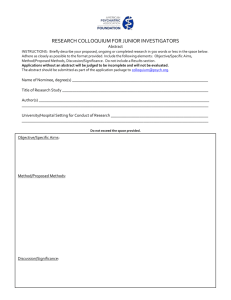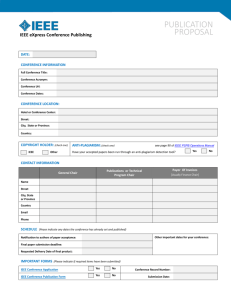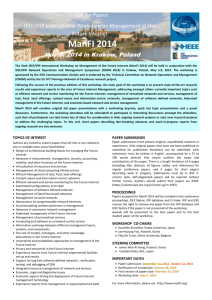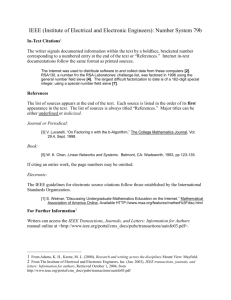ee 400/500 colloquium overview - Electrical Engineering
advertisement
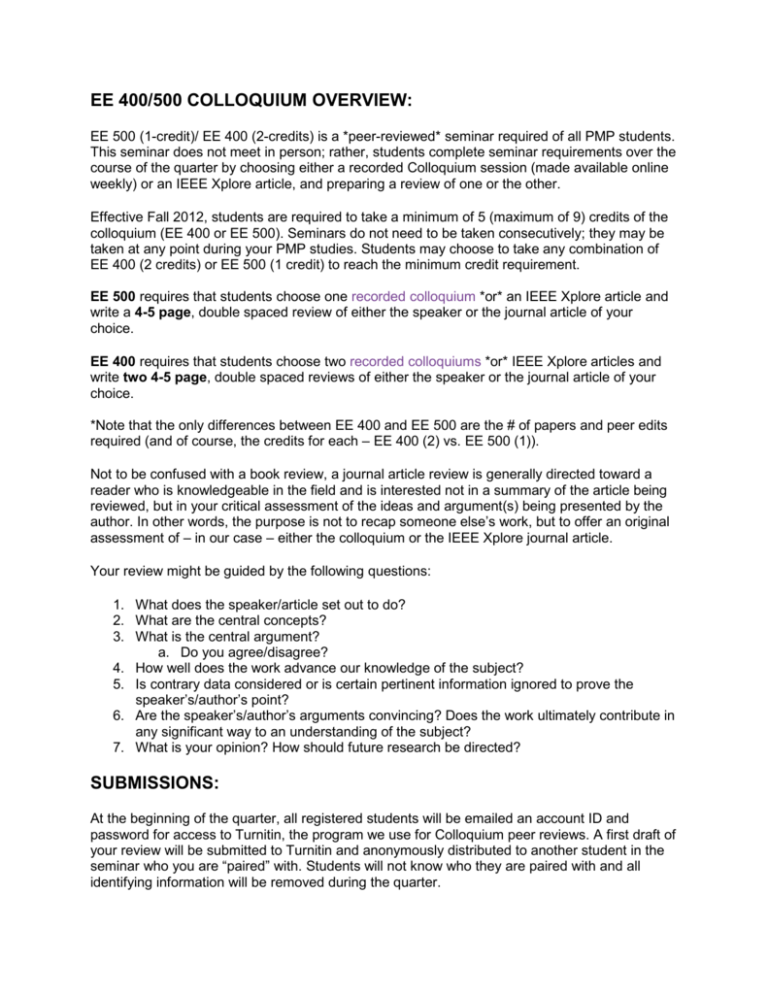
EE 400/500 COLLOQUIUM OVERVIEW: EE 500 (1-credit)/ EE 400 (2-credits) is a *peer-reviewed* seminar required of all PMP students. This seminar does not meet in person; rather, students complete seminar requirements over the course of the quarter by choosing either a recorded Colloquium session (made available online weekly) or an IEEE Xplore article, and preparing a review of one or the other. Effective Fall 2012, students are required to take a minimum of 5 (maximum of 9) credits of the colloquium (EE 400 or EE 500). Seminars do not need to be taken consecutively; they may be taken at any point during your PMP studies. Students may choose to take any combination of EE 400 (2 credits) or EE 500 (1 credit) to reach the minimum credit requirement. EE 500 requires that students choose one recorded colloquium *or* an IEEE Xplore article and write a 4-5 page, double spaced review of either the speaker or the journal article of your choice. EE 400 requires that students choose two recorded colloquiums *or* IEEE Xplore articles and write two 4-5 page, double spaced reviews of either the speaker or the journal article of your choice. *Note that the only differences between EE 400 and EE 500 are the # of papers and peer edits required (and of course, the credits for each – EE 400 (2) vs. EE 500 (1)). Not to be confused with a book review, a journal article review is generally directed toward a reader who is knowledgeable in the field and is interested not in a summary of the article being reviewed, but in your critical assessment of the ideas and argument(s) being presented by the author. In other words, the purpose is not to recap someone else’s work, but to offer an original assessment of – in our case – either the colloquium or the IEEE Xplore journal article. Your review might be guided by the following questions: 1. What does the speaker/article set out to do? 2. What are the central concepts? 3. What is the central argument? a. Do you agree/disagree? 4. How well does the work advance our knowledge of the subject? 5. Is contrary data considered or is certain pertinent information ignored to prove the speaker’s/author’s point? 6. Are the speaker’s/author’s arguments convincing? Does the work ultimately contribute in any significant way to an understanding of the subject? 7. What is your opinion? How should future research be directed? SUBMISSIONS: At the beginning of the quarter, all registered students will be emailed an account ID and password for access to Turnitin, the program we use for Colloquium peer reviews. A first draft of your review will be submitted to Turnitin and anonymously distributed to another student in the seminar who you are “paired” with. Students will not know who they are paired with and all identifying information will be removed during the quarter. All submissions MUST INCLUDE THE FOLLOWING: 1. Colloquium Date/Title (if applicable) 2. IEEE Xplore article Title, Author and link 3. DO NOT INCLUDE YOUR NAME, STUDENT # or ANY IDENTIFYING INFORMATION Reviewers will then read the draft and provide feedback via Turnitin PeerMark. Guidelines for feedback may include (but are not limited to): 1. Do you have a clear understanding of the topic being discussed? 2. Does the student provide a critical/original evaluation of the talk/article, or simply summarize someone else’s work? 3. Does the student point out any contrary data? Did the student present alternative opinions? 4. Does the student provide ideas on how future research should be directed? Once peer reviews have been completed, feedback will be returned to the student for final edits. Final drafts will be reviewed by the original reviewer, and a final grade (CR/NC) will be assigned by the reviewer. If you choose to review a Colloquium Seminar: The seminar presentations are available to PMP students as recorded videos of the weekly EE Colloquium series. The recordings are available as both Flash videos and video podcasts. Please note that it can take several days after a seminar presentation for the video recordings to be posted. Speakers are both internal and external to UWEE and UW, and cover a variety of topics of interest to electrical engineers in all areas. If you choose to review an IEEE Xplore article: Research review papers can be chosen from any modern electrical engineering area. You can search for relevant articles/papers by going to IEEE Xplore ®, where all papers are available for free once you are officially registered at the University of Washington and have your UW NetID. To access IEEE Xplore ® from off-campus, follow these instructions: 1. Go to: http://www.lib.washington.edu.offcampus.lib.washington.edu/ and, if not yet logged in, click the "off-campus access" button at the top right of the page. 2. Enter the web address: http://ieeexplore.ieee.org.offcampus.lib.washington.edu/Xplore/dynhome.jsp, which takes you to the IEEE Xplore ® search engine. 3. Browse to “Journals and Magazines,” in the upper left, and then click the radio buttons to show only IEEE Journals & Magazines, followed by clicking “Update.” You will then see a clickable list of EE Research Magazines, packed with tutorials of the most recent research topics. Please choose an article with significant content - 4 pages or longer. FALL QUARTER 2012 DEADLINES EE 400 STUDENTS: October 10th: PAPER 1 FIRST DRAFT DUE October 17th: PAPER 1 PEER EDITS DUE October 26th: PAPER 1 FINAL DUE November 14th: PAPER 2 DRAFT DUE November 21st: PAPER 2 PEER EDITS DUE November 30th: PAPER 2 FINAL DUE December 10th: PAPER 2 PEER EDITS/GRADES DUE EE 500 STUDENTS: November 5th: PAPER 1 DRAFT DUE November 19th: PEER EDITS DUE December 3rd: PAPER 1 FINAL DUE December 10th: PEER EDITS/GRADES DUE ACADEMIC MISCONDUCT & PLAGIARISM Papers should be original work. Copying (or plagiarizing) someone's work, without giving due recognition, is unacceptable. If you have any questions as to what constitutes cheating or plagiarism, please refer to the COE Academic Misconduct Policy.
